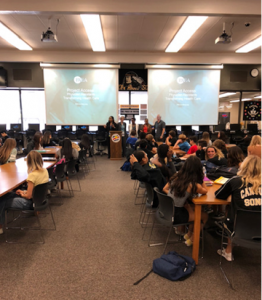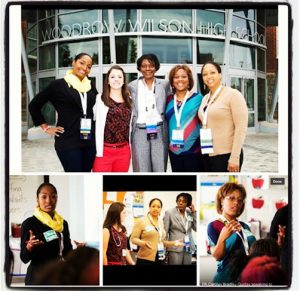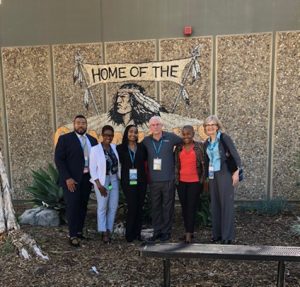AAPA 2022: Project Access Reignite
With Updated Toolkit, Project Access Can be Done Anywhere, Anytime
May 18, 2022
By Andrea Lowe, Director of Health Equity and DEI Initiatives
In 1987, a group of minority PAs organized by PA Brenda Jackson began visiting K-12 classrooms to initiate conversations about issues affecting local communities – drug and substance abuse, HIV/AIDS, violence – and to raise students’ awareness about the PA profession.

What is Project Access?
This grassroots community outreach initiative is the origin of the current Project Access, a program to increase the number of underrepresented PAs in the profession, provide more accessible primary care, and eliminate health disparities. According to the 2020 NCCPA annual report, PAs from groups who are Underrepresented in Medicine (URM) comprised only ~6.8% of those who preferred to answer the question about their race. As Project Access volunteers, PAs give presentations at schools and other community organizations to encourage underrepresented minority students to consider becoming a PA.
At AAPA 2022 later this month, AAPA will re-ignite Project Access with a presentation from Veronica Coleman, MPAS, PA-C; Robert Smith, MS, DHSc, PA-C, DFAAPA; and Robert Wooten MS, PA-C, DFAAPA, to educate PAs about Project Access and demonstrate how PAs can be ambassadors for the initiative in their own communities. The presentation will provide PAs with the tools and resources to do a Project Access event anytime and anywhere!
This year’s conference will set off AAPA’s yearlong campaign of 23 in 23 by ’23. The call to action is to have at least 23 Project Access engagements in at least 23 states by Conference in 2023. PAs will have the opportunity to record information about their Project Access engagements and submit this data to AAPA. More information about 23 in 23 by ’23 will be available leading up to PA Week 2022.
All the Resources You Need for Project Access
While the Project Access re-launch will draw on the energy of conference, it’s up to PAs to keep this momentum going throughout the year by proactively planning visits and spreading the word about Project Access within their states and communities.

Although the “project” in Project Access might sound intimidating, presentations do not need to be stressful or time-consuming. “The actual process is so very simple and does not require much extra work once the school has been contacted and approves the Project Access visit,” PA Coleman says.
Following Conference, a toolkit for volunteers will be available on the DEI Resource Center page. This toolkit will be aligned with the updated PAEA Project Access Toolkit, which includes downloadable materials, like a guide to finding a host school or community organization; pre- and-post-visit checklists; tips for presenting; and frequently asked questions. These materials help ensure that volunteer groups are utilizing the same foundational tools and delivering the same message.
The “Ultimate Reward”
Coleman, who has been participating in Project Access for well over a decade, began working with the program as a student attendee at AAPA conferences. “It sounded like such an awesome opportunity to tell young people about a profession and field of medicine that I am so proud of,” she says. “When I made the decision to join academia and become a PA educator, it opened up a whole new level of Project Access and I’ve never looked back.”

For Coleman, the most rewarding part of the project is witnessing students’ excitement after learning the PA career is a possibility for them. For many students, Project Access may be the first time they hear about the profession or speak to a PA that looks like them. Coleman says the “ultimate reward” is when students seek out her mentorship after giving a presentation.
Project Access is just one way AAPA is supporting efforts to diversify the profession. AAPA has recently procured Vituity as our first DEI corporate partner. At AAPA 2022, Vituity will be participating in the DEI Commission Meet and Greet on Tuesday, May 24 at 6:00 p.m.
For PAs attending conference, make sure to check out the Project Access presentation on Monday, May 23 at 8:30 a.m. Additionally, view all conference events related to diversity and health equity using the code “DIVR – Disparities/Diversity” when searching by CME Track in the conference scheduler.
You May Also Like
Diversity, Equity, and Inclusion Resource Center
The Case for Inclusion and Diversity in PA Cohorts
PA Foundation Announces Scholarship for Black PA Students
Thank you for reading AAPA’s News Central
You have 2 articles left this month. Create a free account to read more stories, or become a member for more access to exclusive benefits! Already have an account? Log in.



